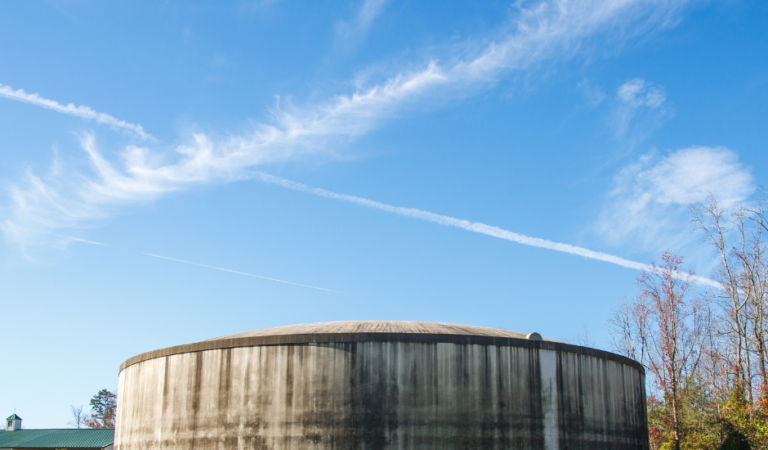 11th March 2022
11th March 2022What Are Concrete Tanks Used For?
Concrete tanks have a wide variety of purposes across several different industries. They can be placed underground but are also a familiar sight above ground too.
In this Clarion Water blog we’ll answer the question, ‘What are concrete tanks used for?’ We’ll also explore some of the advantages and disadvantages of using concrete water storage tanks to store potable water.
What are some uses for concrete tanks?
Concrete tanks are used for storage and in particular, they are most commonly designed to store liquids ready for use in a range of applications. Concrete tanks are used for storage in many different industries including agriculture, chemical manufacturing and food preparation as well as industries supplying clean water for human consumption.
Concrete tanks can be used to safely store hazardous chemicals and substances. They can also be used to collect and store excess rainwater and to hold water ready for a wide array of uses such as firefighting and farming (both for crops and for livestock.)
Concrete water tanks can also be used to store potable water i.e. water that is safe to be used for human drinking water.
Is it safe to store potable water in a concrete tank?
You may be wondering if it’s safe to store water that will be used for drinking in a concrete tank? The short answer to this question is yes. It is generally safe to store potable water in a concrete tank. However, it is always very important to seek professional advice when choosing a water storage tank, in order to ensure that the tank will meet your specific needs.
For more detailed information about the safety of water storage tanks, please see our previous blog, Are Concrete Water Tanks Safe?
What are the advantages of concrete water tanks?
There are several advantages to using concrete water tanks. Water tanks constructed from concrete are hard-wearing and long-lasting, which makes them an obvious choice for long-term water storage needs. Concrete can also be fashioned into any shape required and once they are constructed, concrete water tanks are robust and will remain in place for many decades, requiring very little maintenance at all.
Concrete tanks also benefit from thermal mass, which means that they can keep the temperature of the water stored inside them relatively stable, even in extreme weather and fluctuating external temperatures. Maintaining a consistent water temperature will help to keep portable water safe for drinking.
What are the disadvantages of concrete water tanks?
Unfortunately, concrete water tanks do have their disadvantages too. The most common problems with concrete tanks are with leaks and cracks.
Because concrete is incredibly strong, it’s also fairly inflexible. This means that as it expands and contracts over time, the concrete itself will weaken and eventually begin to crack.
Not only can cracked tanks lead to the obvious problem of water leaks, but cracks in the concrete can also provide potential harmful bacteria with the opportunity to grow. This can be incredibly dangerous if the tank is being used to store water that will be used for human consumption.
Legionella is a type of bacteria that is commonly found in water tanks that have not been properly maintained or repaired. Legionella bacteria is incredibly hazardous to health and can cause serious illness and even death.
Legionnaire’s Disease is a potentially fatal type of pneumonia, it can affect anyone who inhales water droplets containing the bacteria but it is most dangerous to elderly people, people with cancer, diabetes and respiratory or kidney disease, as well as smokers and smokers, alcoholics.
Therefore it’s important that if you are using a concrete water tank to store potable water, you ensure that the tank meets HSE water storage standards. If it doesn’t, you will need to replace or refurbish your concrete water tank in order to bring it up to the required standards and ensure your water is safe for drinking. This is something we can help with at Clarion Water. See our recent case study for more information.
Get In Touch
We hope that has answered the question, ‘What are concrete tanks used for?’
Here at Clarion Water, we’re specialists in cold water tank repairs, relines and installations. Collectively we have over 30 years of experience in water hygiene and legionella. No matter what industry our clients are in, our aim is always to provide our customers with a professional, cost-effective and high spec solution for their water management systems.
If you have any further questions about concrete water storage tanks or you would like to discuss concrete water tank refurbishment or any of our other cold water storage services, then don’t hesitate to get in touch. You can also call us on 01943 872311 or email us at info@clarionwater.co.uk.